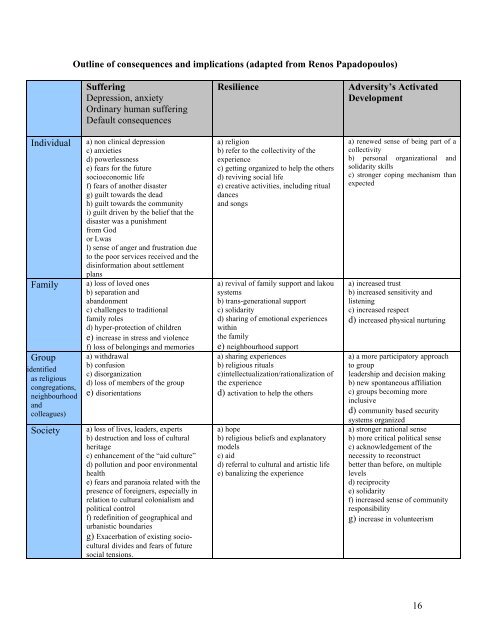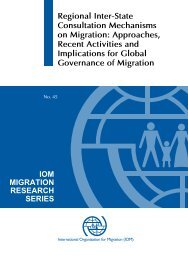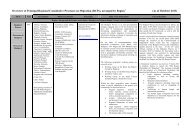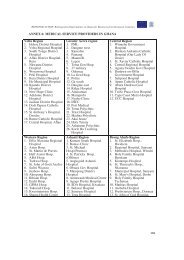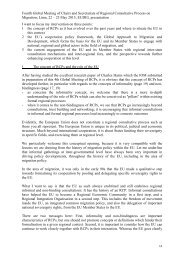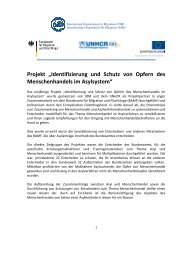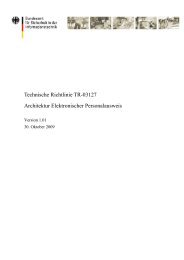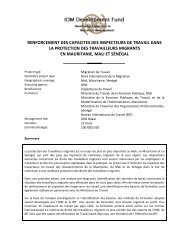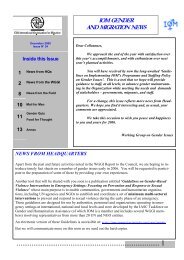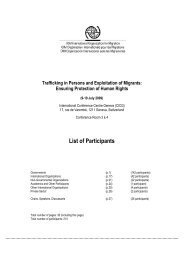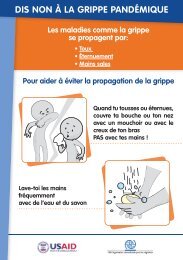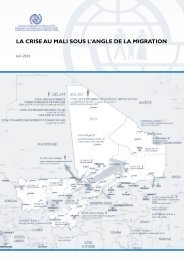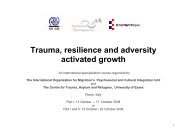IOM - Assessment on the Psychosocial Needs of Haitians Affected ...
IOM - Assessment on the Psychosocial Needs of Haitians Affected ...
IOM - Assessment on the Psychosocial Needs of Haitians Affected ...
You also want an ePaper? Increase the reach of your titles
YUMPU automatically turns print PDFs into web optimized ePapers that Google loves.
Outline <strong>of</strong> c<strong>on</strong>sequences and implicati<strong>on</strong>s (adapted from Renos Papadopoulos)<br />
Suffering<br />
Depressi<strong>on</strong>, anxiety<br />
Ordinary human suffering<br />
Default c<strong>on</strong>sequences<br />
Resilience<br />
Adversity’s Activated<br />
Development<br />
Individual<br />
Family<br />
Group<br />
identified<br />
as religious<br />
c<strong>on</strong>gregati<strong>on</strong>s,<br />
neighbourhood<br />
and<br />
colleagues)<br />
Society<br />
a) n<strong>on</strong> clinical depressi<strong>on</strong><br />
c) anxieties<br />
d) powerlessness<br />
e) fears for <strong>the</strong> future<br />
socioec<strong>on</strong>omic life<br />
f) fears <strong>of</strong> ano<strong>the</strong>r disaster<br />
g) guilt towards <strong>the</strong> dead<br />
h) guilt towards <strong>the</strong> community<br />
i) guilt driven by <strong>the</strong> belief that <strong>the</strong><br />
disaster was a punishment<br />
from God<br />
or Lwas<br />
l) sense <strong>of</strong> anger and frustrati<strong>on</strong> due<br />
to <strong>the</strong> poor services received and <strong>the</strong><br />
disinformati<strong>on</strong> about settlement<br />
plans<br />
a) loss <strong>of</strong> loved <strong>on</strong>es<br />
b) separati<strong>on</strong> and<br />
aband<strong>on</strong>ment<br />
c) challenges to traditi<strong>on</strong>al<br />
family roles<br />
d) hyper-protecti<strong>on</strong> <strong>of</strong> children<br />
e) increase in stress and violence<br />
f) loss <strong>of</strong> bel<strong>on</strong>gings and memories<br />
a) withdrawal<br />
b) c<strong>on</strong>fusi<strong>on</strong><br />
c) disorganizati<strong>on</strong><br />
d) loss <strong>of</strong> members <strong>of</strong> <strong>the</strong> group<br />
e) disorientati<strong>on</strong>s<br />
a) loss <strong>of</strong> lives, leaders, experts<br />
b) destructi<strong>on</strong> and loss <strong>of</strong> cultural<br />
heritage<br />
c) enhancement <strong>of</strong> <strong>the</strong> “aid culture”<br />
d) polluti<strong>on</strong> and poor envir<strong>on</strong>mental<br />
health<br />
e) fears and paranoia related with <strong>the</strong><br />
presence <strong>of</strong> foreigners, especially in<br />
relati<strong>on</strong> to cultural col<strong>on</strong>ialism and<br />
political c<strong>on</strong>trol<br />
f) redefiniti<strong>on</strong> <strong>of</strong> geographical and<br />
urbanistic boundaries<br />
g) Exacerbati<strong>on</strong> <strong>of</strong> existing sociocultural<br />
divides and fears <strong>of</strong> future<br />
social tensi<strong>on</strong>s.<br />
a) religi<strong>on</strong><br />
b) refer to <strong>the</strong> collectivity <strong>of</strong> <strong>the</strong><br />
experience<br />
c) getting organized to help <strong>the</strong> o<strong>the</strong>rs<br />
d) reviving social life<br />
e) creative activities, including ritual<br />
dances<br />
and s<strong>on</strong>gs<br />
a) revival <strong>of</strong> family support and lakou<br />
systems<br />
b) trans-generati<strong>on</strong>al support<br />
c) solidarity<br />
d) sharing <strong>of</strong> emoti<strong>on</strong>al experiences<br />
within<br />
<strong>the</strong> family<br />
e) neighbourhood support<br />
a) sharing experiences<br />
b) religious rituals<br />
c)intellectualizati<strong>on</strong>/rati<strong>on</strong>alizati<strong>on</strong> <strong>of</strong><br />
<strong>the</strong> experience<br />
d) activati<strong>on</strong> to help <strong>the</strong> o<strong>the</strong>rs<br />
a) hope<br />
b) religious beliefs and explanatory<br />
models<br />
c) aid<br />
d) referral to cultural and artistic life<br />
e) banalizing <strong>the</strong> experience<br />
a) renewed sense <strong>of</strong> being part <strong>of</strong> a<br />
collectivity<br />
b) pers<strong>on</strong>al organizati<strong>on</strong>al and<br />
solidarity skills<br />
c) str<strong>on</strong>ger coping mechanism than<br />
expected<br />
a) increased trust<br />
b) increased sensitivity and<br />
listening<br />
c) increased respect<br />
d) increased physical nurturing<br />
a) a more participatory approach<br />
to group<br />
leadership and decisi<strong>on</strong> making<br />
b) new sp<strong>on</strong>taneous affiliati<strong>on</strong><br />
c) groups becoming more<br />
inclusive<br />
d) community based security<br />
systems organized<br />
a) str<strong>on</strong>ger nati<strong>on</strong>al sense<br />
b) more critical political sense<br />
c) acknowledgement <strong>of</strong> <strong>the</strong><br />
necessity to rec<strong>on</strong>struct<br />
better than before, <strong>on</strong> multiple<br />
levels<br />
d) reciprocity<br />
e) solidarity<br />
f) increased sense <strong>of</strong> community<br />
resp<strong>on</strong>sibility<br />
g) increase in volunteerism<br />
16


